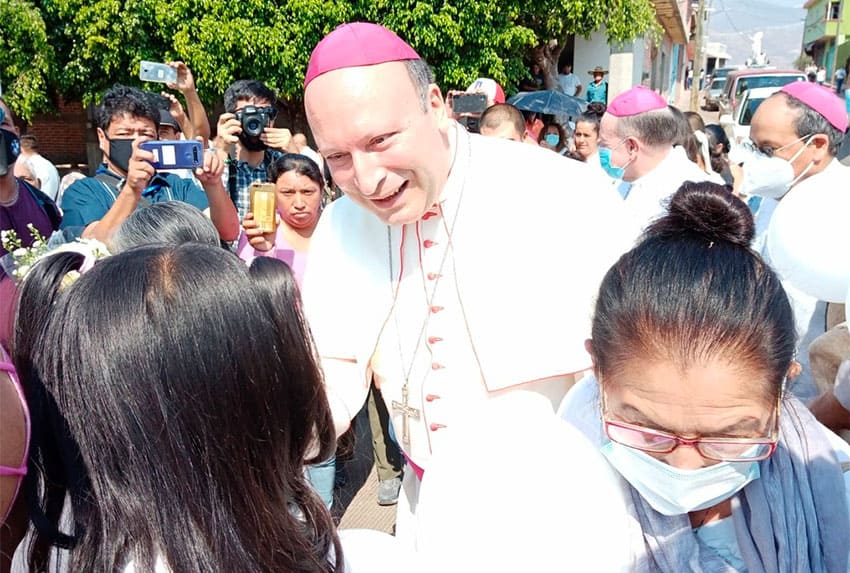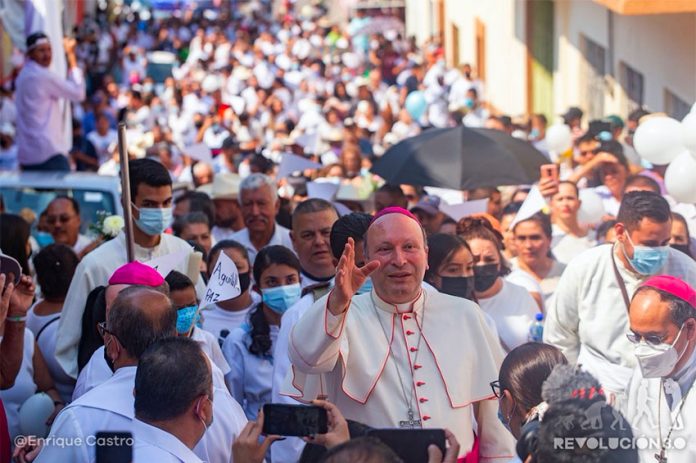Organized crime thrives where the state is absent, the Vatican’s ambassador to Mexico said Friday, offering a critical assessment of the federal government’s response to insecurity during a visit to the violence-stricken town of Aguililla, Michoacán.
“In Italy we know that the mafia flourishes where the state isn’t [present]. Private interests appear that try to impose themselves,” Archbishop Franco Coppola, papal nuncio to Mexico, said in Aguililla, where he met with locals, including victims of crime, and celebrated Mass.
Aguililla, a Tierra Caliente municipality 270 kilometers southwest of the state capital Morelia, has been plagued by violence in recent months as the Jalisco New Generation Cartel (CJNG) and the Cárteles Unidos vie for control but Coppola, an Italian who has been nuncio to Mexico since 2016, noted that the situation there is not unique.
“Unfortunately violence is not [just] characteristic of Michoacán [but] all of Mexico,” he said.
Indeed, 2020 was the second most violent year on record – despite the pandemic – with more than 34,000 homicides.
Coppola said the state does have the capacity to improve the security situation but must have the will to do so. The security contingent that accompanied him during his journey to Aguililla from Apatzingán on a highway that was impassable until earlier this week due to blockades set up by organized crime was evidence of that capacity, the nuncio said.
“If [the state] wants to, it can,” he declared. Referring to a procession through the streets of Aguililla in which he, other Catholic Church leaders and townsfolk took part on Friday morning, Coppola said: “These streets, overtaken by crime, have been walked on by the people with resurrected Christ.”
“… I saw what happened in Aguililla before Holy Week. I saw the photos of the decapitated [cartel members],” the archbishop said, referring to the presumed Cártles Unidos members who were killed and beheaded, allegedly by the CJNG, in late March.
“I shared the photos on Facebook because I wanted my friends in Italy to see what happened but Facebook blocked the photos,” he told reporters.
“So I said, we’re going to go there and we’re going to flood the internet with what’s happening in Aguililla. … It’s very important that what’s happening is known. Bad people take advantage of silence.”
At a press conference after Friday’s Mass, Coppola, who has previously represented the Vatican in Burundi and Chad, said that former federal government officials had asked him not to talk about the high levels of cartel violence in Mexico so as to not scare off tourists. The warning came in 2018 during the government of then president Enrique Peña Nieto, he said.

“… They said to me in the Foreign Ministry: ‘Monsignor, please don’t talk so much about the violence in Mexico, which is harmful to tourism, then people don’t come out of fear,’” Coppola said.
The apostolic nuncio also said he was generally surprised at the lack of public discussion about the security situation in Mexico, home of 18 of the 50 most violent cities in the world, according to a study published this week.
He said he wanted to visit Aguililla – where he was greeted by residents holding white balloons symbolic of their desire for peace – to show the Catholic Church’s support for the town.
“The duty of the church is to be on the side of the people, those who suffer, so I want to be here,” Coppola said.
The only other recent official acknowledgement of the troubles facing the community was a tour of the area earlier this month by Governor Silvano Aureoles. But the highlight of the visit proved to be an incident in which he was caught on video shoving a man protesting the violence in Aguililla.
Coppola’s visit came after he reportedly chastised Mexico’s bishops for being estranged from the faithful and doing nothing for the Catholic community.
To reach the town, Coppola passed through no fewer than five security checkpoints on the 84-kilometer-long Apatzingán-Aguililla highway, which was blocked for about four months by trenches, stones and vehicles, cutting off residents and interrupting supply chains for basic goods such as food and gasoline. Michoacán police and soldiers manned the various checkpoints to ensure the archbishop’s safe arrival in Aguililla.
Along the way, Coppola – accompanied by Apatzingán Bishop Cristóbal Ascencio, who invited him to visit Aguililla – waved to and blessed the residents of several small towns who lined the highway to welcome him.
Among the communities through which he passed were El Terrero, where a group of women took up arms earlier this year to protect the small town from the CJNG, and El Aguaje, where state police were attacked with explosive-laden drones this week.
The Jalisco cartel, which now has considerable influence in Aguililla – the municipality where its leader, Nemesio “El Mencho” Oseguera Cervantes, was born – and other parts of Michocán as well as numerous other states, is accused of carrying out the drone attack, which injured two officers.
